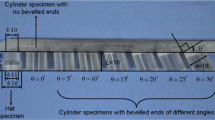Abstract
A series of tensile and three-point bending studies was conducted at various temperatures and loading rates using a commercial poly(methyl methacrylate) (PMMA). Tensile properties and fracture toughness data were obtained for the various conditions. In general, both tensile strength and fracture toughness increase with increasing loading rate and decreasing temperatur E. However, when the temperature reaches the glass transition region, the relationships between fracture toughness, loading rate, and temperature become very complex. This behaviour is due to the simultaneous interaction of viscoelasticity and localized plastic deformation. In the glass transition region, the fracture mechanism changes from a brittle to a ductile mode of failure. A failure envelope constructed from tensile tests suggests that the maximum elongation that the glassy PMMA can withstand without failure is about 130%. The calculated apparent activation energies suggest that the failure process of thermoplastic polymers (at least PMMA) follows a viscoelastic process, either glass orβ transition. The former is the case if crack initiation is required.
Similar content being viewed by others
References
P. I. Vincent, in “Encyclopedia of Polymer Science and Technology”, Vol. 7 (John Wiley, New York, 1967) p. 292.
J. G. Williams, “Fracture Mechanics of Polymers”, Chap 6 (John Wiley, New York, 1984).
H. H. Kausch andJ. G. Williams, in “Encyclopedia of Polymer Science and Engineering”, Vol. 6, 2nd Edn. (John Wiley, New York, 1986).
R. Seldon,Polym. Testing 7 (1987) 209.
L. H. Lee, J. F. Mandell andF. J. McGarry,Polym. Eng. Sci. 27(15) (1987) 1128.
G. P. Marshall, L. H. Coutts andJ. G. Williams,J. Mater. Sci. 9 (1974) 1409
Tensile properties of Plastics”, ASTM D638-81, 1981.
Plane-Strain Fracture Toughness of Metallic Materials, ASTM E399-81, 1981.
Flexural Properties of Unreinforced and Reinforced Plastics and Electric Insulating Materials, ASTM D790-81, 1981.
R. W. Hertzberg, “Deformation and Fracture Mechanics of Engineering Materials”, 2nd edn, Chapter 8, (John Wiley, New York, 1983).
J. G. Williams, “A Linear Elastic Fracture Mechanics (LEFM) Standard for Determinating Kc and Gc for Plastics”, ASTM D20 meeting, Palm Beach, Florida, 1987.
J. G. Williams, “Fracture Mechanics of Polymers”, Chap 2 (John Wiley, New York, 1984).
G. R. Irwin, “Handbuch der Physik”, Vol. VI (Springer, Berlin, 1958) p. 49.
K. Mizutani,J. Mater. Sci. Lett. 6 (1987) 915.
G. P. Marshall andJ. G. Williams,ibid. 8 (1973) 138.
R. W. Hertzberg andJ. A. Manson, “Fatigue of Engineering Plastics,” Chapter 3 (Academic Press, New York, 1980).
N. G. McCrum, B. E. Read andG. Williams, “Anelastic and Dielectric Effects in Polymeric Solids” (John Wiley, New York, 1967).
R. F. Boyer,Polym Eng. Sci. 8(3) (1968) 161.
G. P. Marshall, L. H. Coutts andJ. G. Williams,J. Mater. Sci. 9 (1974) 1409.
Author information
Authors and Affiliations
Additional information
Deceased.
Rights and permissions
About this article
Cite this article
Cheng, W.M., Miller, G.A., Manson, J.A. et al. Mechanical behaviour of poly(methyl methacrylate). J Mater Sci 25, 1917–1923 (1990). https://doi.org/10.1007/BF01045743
Received:
Accepted:
Issue Date:
DOI: https://doi.org/10.1007/BF01045743




